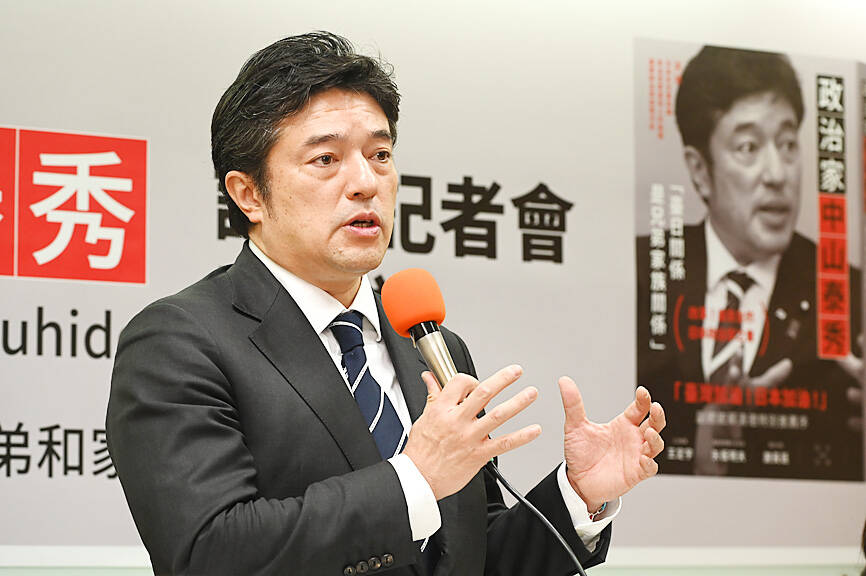Japan is likely to recognize Taiwan as a country should the nation continue to be governed freely and democratically, former Japanese vice minister of defense Yasuhide Nakayama said in Taipei yesterday.
Nakayama visited Taiwan for the first time to promote the Chinese-language version of his book Statesman Yasuhide Nakayama.
Two Japanese House Representatives from the Constitutional Democratic Party recently said that Taiwan had escalated tensions with China, and urged Japanese Prime Minister Fumio Kishida to state that he does not support Taiwanese independence.

Photo: Tien Yu-hua, Taipei Times
“Their statements do not represent the ruling party or the Japanese government. Nor do they have any bearing on government policy,” Nakayama said at a news conference.
However, “Japan is a free and democratic country, and any political party is free to state its position,” he added.
“Taiwan has all the basic elements of a nation — territory, people and a clearly defined population. I believe that it is highly possible that Taiwan will be recognized by Japan as a country if it maintains a free and democratic system,” Nakayama said.
Okinawa Prefecture Governor Denny Tamaki last month told Chinese daily the Global Times that he did not agree with former Japanese prime minister Shinzo Abe’s statement that “a Taiwanese emergency is a Japanese emergency.”
Okinawans would “not allow” the prefecture “to be targeted by military strikes,” Tamaki added.
Asked to respond to the comments, Nakayama said that formulating national defense policy is the jurisdiction of the Japanese government, and statements by local officials do not affect national policy.
Tokyo reportedly is planning to expand military units on Okinawa in anticipation of possible conflicts with China over Taiwan.
Nakayama said the Japanese government has been concerned about China’s ambitions in the South China Sea and the Ryukyu Islands, and that Japan has been increasing its defense budget since the Abe administration, including reinforcing the Ryukyu Islands’ military infrastructure.
It is important that the US, Japan and other democratic allies protect Taiwan and make sure that it is not orphaned by the international community, he said.
In his opening remarks at the news conference, Nakayama cited China and Russia as the two biggest military threats facing Japan.
When China held military exercises in August following the visit to Taiwan by US House of Representative Speaker Nancy Pelosi, five ballistic missiles were reportedly fired into waters that are part of Japan’s exclusive economic zone.
“It was not a coincidence. The Chinese People’s Liberation Army did it on purpose to threaten Japan. This is evidence of why ‘a Taiwanese emergency is Japanese emergency,’” Nakayama said.
“Unlike World War II, nearly 80 years ago, when war was mainly fought on land, at sea and in the air, the battlefields have now expanded to space, cyberspace and electromagnetic technology” that targets radar and communications systems, he said.
Taiwan needs to strengthen its resilience in these new battlefields, and increase partnerships with the US and Japan against possible Chinese attacks, he said.
Ukrainians would not be winning the war against Russia without satellite services provided by Elon Musk, he added.

AGING: As of last month, people aged 65 or older accounted for 20.06 percent of the total population and the number of couples who got married fell by 18,685 from 2024 Taiwan has surpassed South Korea as the country least willing to have children, with an annual crude birthrate of 4.62 per 1,000 people, Ministry of the Interior data showed yesterday. The nation was previously ranked the second-lowest country in terms of total fertility rate, or the average number of children a woman has in her lifetime. However, South Korea’s fertility rate began to recover from 2023, with total fertility rate rising from 0.72 and estimated to reach 0.82 to 0.85 by last year, and the crude birthrate projected at 6.7 per 1,000 people. Japan’s crude birthrate was projected to fall below six,

Conflict with Taiwan could leave China with “massive economic disruption, catastrophic military losses, significant social unrest, and devastating sanctions,” a US think tank said in a report released on Monday. The German Marshall Fund released a report titled If China Attacks Taiwan: The Consequences for China of “Minor Conflict” and “Major War” Scenarios. The report details the “massive” economic, military, social and international costs to China in the event of a minor conflict or major war with Taiwan, estimating that the Chinese People’s Liberation Army (PLA) could sustain losses of more than half of its active-duty ground forces, including 100,000 troops. Understanding Chinese

US President Donald Trump in an interview with the New York Times published on Thursday said that “it’s up to” Chinese President Xi Jinping (習近平) what China does on Taiwan, but that he would be “very unhappy” with a change in the “status quo.” “He [Xi] considers it to be a part of China, and that’s up to him what he’s going to be doing, but I’ve expressed to him that I would be very unhappy if he did that, and I don’t think he’ll do that. I hope he doesn’t do that,” Trump said. Trump made the comments in the context

SELF-DEFENSE: Tokyo has accelerated its spending goal and its defense minister said the nation needs to discuss whether it should develop nuclear-powered submarines China is ramping up objections to what it sees as Japan’s desire to acquire nuclear weapons, despite Tokyo’s longstanding renunciation of such arms, deepening another fissure in the two neighbors’ increasingly tense ties. In what appears to be a concerted effort, China’s foreign and defense ministries issued statements on Thursday condemning alleged remilitarism efforts by Tokyo. The remarks came as two of the country’s top think tanks jointly issued a 29-page report framing actions by “right-wing forces” in Japan as posing a “serious threat” to world peace. While that report did not define “right-wing forces,” the Chinese Ministry of Foreign Affairs was